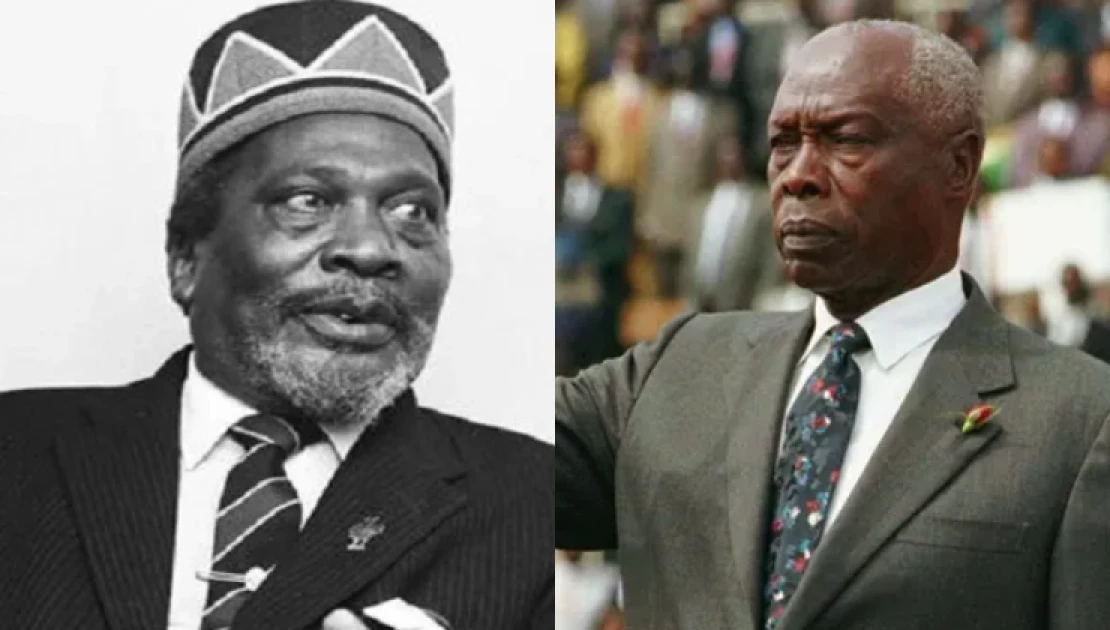How Parliament created law exempting former presidents Jomo Kenyatta, Moi from tax

A side-by-side image of the late former Presidents Jomo Kenyatta and Daniel Moi. PHOTO| COURTESY
And now, whether for taxes or politics, Nandi Senator Samson Cherargei has written to the clerk of the Senate seeking to amend the old statute that exempted former Presidents Jomo Kenyatta and Daniel Moi from paying a special tax on the passing of inheritance to their families.
The Estate Duty tax which is as old as the republic was amended two times during the reigns of the two presidents to remove them from the list of taxation of their estates.
At the birth of the nation in 1963, the Kenyan Parliament got busy writing or amending laws to manage the affairs of the newborn country. One of the laws amended was the Estate Duty Act, CAP 483, which amendments were assented to by the founding father Jomo Kenyatta on the 12th of June 1969.
Section 7 of the Act imposes the estate duty stating, “Whenever any person dies […], a tax known as estate duty shall, […] be levied and paid on all property on which the deceased (person) was at the time of his death competent to dispose.
An Excise Duty shall be levied on all property in which the deceased or any other person had an interest, ceasing upon the death of the deceased and on all property which immediately before the death was held for the use or enjoyment of two or more persons of whom the deceased was one."
For six years the law was applicable to every Kenyan upon their death.
But there was something curious about the amendments signed into law by the founding president.
It was Wednesday the 25th of June, 1969 the president signed into law a miscellaneous amendments Act. Among the many amendments was Section 7 of the Estate Duty Act, introducing a new provision that the imposition of estate duty: “shall not apply to His Excellency Mzee Jomo Kenyatta, First President and Commander in Chief of the armed forces of the Republic of Kenya.”
Jomo Kenyatta died nine years and two months later, heralding the reign of the second President Daniel Moi.
Three years into the term of the second president Daniel arap Moi, Parliament enacted another miscellaneous amendment bill, signed into law by President Moi on the 5th of November that year. It became effective a week later.
The law amended Jomo Kenyatta’s clause deleting the words “first president and commander in chief of the armed forces of the Republic of Kenya, to read, “the section shall not apply to His Excellency Mzee Jomo Kenyatta nor to His Excellency Daniel Toroitich arap Moi”.
Daniel Moi died in February 2020.
At both times of amendments, Charles Mugane Njonjo served in the justice department as attorney general in 1969 and as the minister of justice in 1981. James Karugu succeeded Njonjo as attorney general and was in 1981 replaced by Joseph Kamere under President Moi.
Nandi Senator Samson Cherargei now wants the section amended to delete the exemption of the first two presidents and instead state that the “section shall not apply to the disabled, minorities and marginalized as provided by the relevant law.”
According to article 210 of the constitution, sub-article 3, "No law may exclude or authorise the exclusion of a State officer from payment of tax by reason of—(a) the office held by that State officer; or (b) the nature of the work of the State officer.”
Want to send us a story? SMS to 25170 or WhatsApp 0743570000 or Submit on Citizen Digital or email wananchi@royalmedia.co.ke
Comments
No comments yet.


Leave a Comment